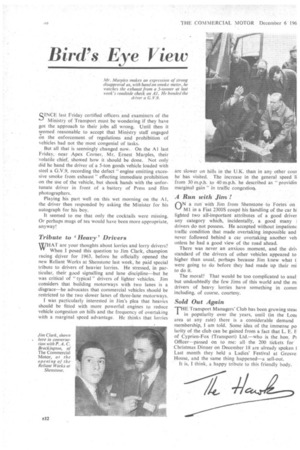Bird's Eye View
Page 68

If you've noticed an error in this article please click here to report it so we can fix it.
SINCE last Friday certified officers and examiners of the " Ministry of Transport must be wondering if they have got the approach to their jobs all wrong. Until then it seemed reasonable to accept that Ministry staff engaged on the enforcement of regulations and prohibition of vehicles had not the'rnost congenial of tasks.
But all that is seemingly changed now. On the Al last Friday, near Apex Corner, Mr. Ernest Marples, their volatile chief, showed how it should be done. Not only did he hand the driver of a 5-ton goods vehicle loaded with steel a G.V.9, recording the defect engine emitting excessive smoke from exhaust effecting immediate prohibition on the use of the vehicle, but shook hands with the unfortunate driver in front of a battery of Press and film photographers.
Playing his part well on this wet morning on the Al, the driver then responded by asking the Minister for his autograph for his boy.
It seemed to me that only the cocktails were missing. Or perhaps mugs of tea would have been more appropriate, anyway!
Tribute to 'Heavy' Drivers
WHAT are your thoughts about lorries and lorry drivers? When I posed this question to Jim Clark, champion racing driver for 1963, before he officially opened the new Reliant Works at Shenstone last week, he paid special tribute to drivers of heavier lorries. He stressed, in particular, their good signalling and lane discipline—but he was critical of " typical " drivers of lighter vehicles. Jim considers that building motorways with two lanes is a disgrace—he advocates that commercial vehicles should be restricted to the two slower lanes of three-lane motorways.
I was particularly interested in Jim's plea that heavies should be fitted with more powerful engines to reduce vehicle congestion on hills and the frequency of overtaking with a marginal speed advantage. He thinks that lorries are slower on hills in the U.K. than in any other cour he has visited. The increase in the general speed li from 30 m.p.h. to 40 m.p.h. he described as providin marginalgain" in traffic congestion.
A Run with Jim'!
nN a run' with Jim from Shenstone to Fortes on M1 in a Fiat 2300S coupe his handling of the car hi lighted two all-important attributes of a good driver any category which, incidentally, a good many I drivers do not possess. He accepted without impatiene traffic condition that made overtaking impossible and never followed behind a car overtaking another veh unless he had a good view of the road ahead.
There was never an anxious moment, and the drib standard of the drivers of other vehicles appeared to higher than usual, perhaps because Jim knew what t were going to do before they had made up their mi to do it.
The moral? That would be too complicated to anal: but undoubtedly the few urns of this world and the rre drivers of heavy lorries have something in comm including, of course, courtesy.
Sold Out Again
THE Transport Managers' Club has been growing steac 1 in popularity over the years, until (in the Lon( area at any rate) there is a considerable demand membership, I am told. Some idea of the immense po larity of the club can be gained from a fact that L. E. E of Cyprien-Fox (Transport) Ltd.—who is the hon. Pr Officer—passed on to me: all the 200 tickets for Christmas Dinner on December 18 are already spoken I Last month they held a Ladies' Festival at Grosvei House, and the same thing happened—a sell-out.
It is, I think, a happy tribute to this friendly body.




























































































































